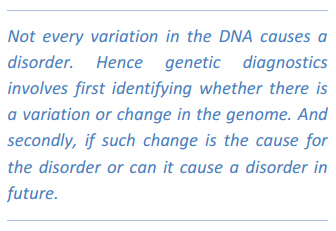Vaidehi Jobanputra, Ph.D.,FACMG

Genetic Disorders refer to any abnormality in the individual gene(s) or the chromosomes which are caused due to the change in the sequence of the DNA or gain or loss of gene(s) or chromosomes. The genes or the DNA carry important information for the functioning of each cell. Genomes (entire set of genes in an individual) are analyzed by studying the DNA (Deoxyribonucleic Acid) and the Chromosomes.
TYPES OF GENETIC DISORDERSGenetic Disorders occur due to any kind of variation in the DNA or Chromosomes during cell division. These disorders may occur De-Novo (i.e. new or not inherited) or may be inherited from parent(s). For simplicity sake, we can look at three types of genetic disorder. Single Gene Disorders – these are caused by mutations in a single gene. There are more than 4000 single gene disorders, such as – Thalassemia, Sickle cell anemia, Cystic fibrosis, Hemophilia etc.
The second types of disorders are called Chromosomal Disorders – these are caused by excess or deficiency of a number of genes on a chromosome or an entire chromosome.Chromosomal Disorders in children are associated with multiple congenital anomalies, dysmorphic features, developmental delay, autism and/or intellectual disabilities. Adults, can also have a chromosome rearrangement and they are normal except that such individuals are at an increased risk of spontaneous abortions, still births, infertility or a live birth child with congenital malformation and or mental retardation.

Approximately, 1 in 500 persons in general population carry such balanced form of chromosome rearrangements.
also has a role in the onset and progress of several Multifactorial Disorders such as Asthma, Autoimmune diseases, certain cancers, Diabetes, Hypertension, Obesity etc.
Genetic factors are also now being recognized in various Cancers. Most cancers have an impairment of the cell functioning caused by mutations in specific genes or chromosome abnormalities.
GENETIC DIAGNOSTICSNot every change in the DNA causes a disorder. Hence genetic diagnostics involves first identifying whether this change (called as a variant) in the genome is a normal polymorphism (common benign change) or a disease associated (pathogenic) change. And secondly, if this variant can cause a disorder in future. Another challenge is about where and how to look for the variations/mutations given that genome is quite wide and complex, and there are a variety of techniques available to study the genome. This is what makes genetics more complex over other forms of diagnostics.

There are a variety of techniques available for studying the changes in the genome. These are primarily classified as Cytogenetics and Molecular studies. Cytogenetics involves techniques such as Karyotyping (G-Banding) or Fluorescence in Situ Hybridization (FISH). Molecular studies involve various PCR and RT-PCR based techniques. Another advanced way of studying the whole genome is a relatively new method called Chromosomal Microarray Analysis (CMA) which is classified as Molecular Cytogenetics and has far better diagnostic potential and use.
CMA or commonly known as Microarray is recent, most advanced and fastest growing technology available. This is a DNA based test which allows for a high resolution scanning of the entire genome. Microarray provides information on thousands of genes in a single test. It can precisely define the missing or extra genes.

Genetic Testing has a wide range of applications beyond the simple diagnosis and identification of genetic disorders. It is useful for Carrier Testing, Prenatal testing, Parental testing, Forensic Testing, Paternity Testing and Drug discovery targeting the faulty gene. Genetic Testing is also playing an important role even in therapeutic decisions regarding the type of drugs and dosage to be administered in specific diseases. In many disorders, especially cancers, the tracking of disease progression and choice of drugs and dosage is determined on the basis of genetic tests.
CONCLUSIONOur understanding of the role of our genome in the functioning of our body and in various disorders is increasing rapidly. Every month, new research is being published which are linking human diseases with a genetic causes. Hence, genetic testing has become a critical element for making complete and accurate diagnosis of various disorders and defining disease progression, implication and possibility of passing it to the next generation. However, given the complex nature of human genome and the diagnostic techniques, genetic testing requires significant expertise in all the aspects of diagnostics right from choice of tests, collection of samples, conducting tests, reporting, interpreting results, understanding the implications and disseminating information.

